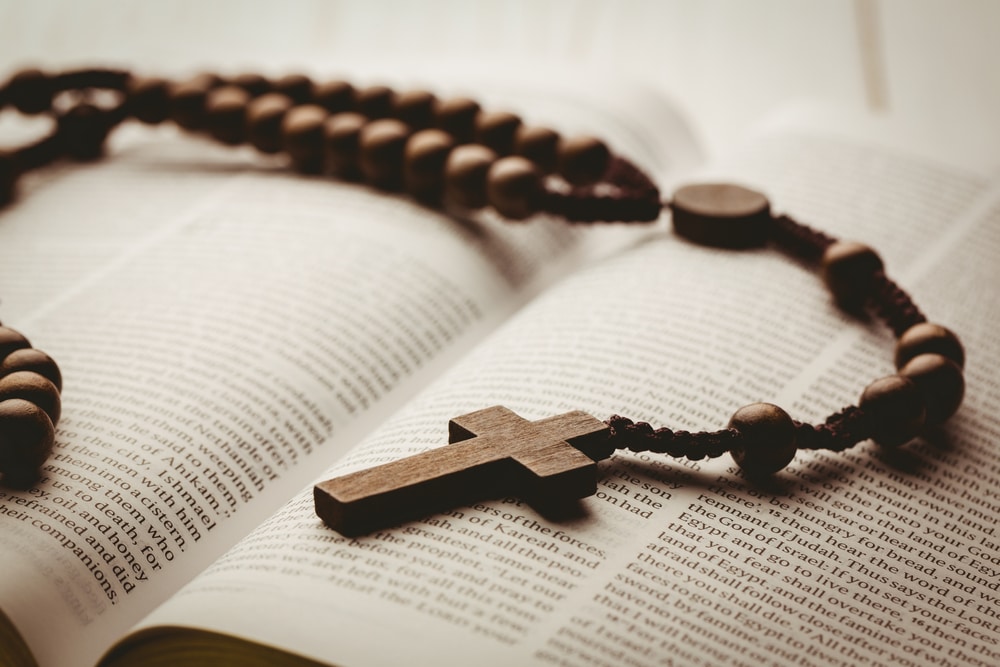
06 Sep, 2022 Key Differences between Catholicism and Biblical Christianity
Biblical Opinion/Theology
By Summer Lane
Recently, the Counter Culture Mom Show featured an interview with Mike Gendron, a former Catholic who converted to Biblical Christianity and stepped into a personal relationship with the Lord Jesus Christ.
The topic of Catholicism vs. Christianity can be dicey – indeed, most Catholics call themselves “Christians.” But, doctrinally, is that accurate? Today’s article intends to examine the differences between Catholicism and Christianity, because it is a hot topic for many people who are struggling to differentiate the key variations between the two.
Why it matters
In John 14:6, Jesus says, “I am the way and the truth and the life. No one comes to the Father except through me.” The differences between Catholicism and Christianity matter, because salvation matters. When it comes to faith, one must examine the Bible itself and compare against Catholic traditionalism. What does it take to reach heaven? Is it works? It is faith? Is it both? If we have a wrong understanding of what it takes, our eternal souls could be in peril. Therefore, this conversation is one of eternally significant value!
Works-Based vs. Faith-Based?
Jesus says that He is the way, the truth, and the life. Ephesians 2:8-9 states that, “For grace you have been saved through faith. And this is not your own doing; it is the gift of God, not a result of works, so that no one may boast.”
In Biblical Christianity, salvation is not earned. Titus 3:5 says, “He saved us, not because of works done by us in righteousness, but according to his own mercy, by washing of regeneration and renewal of the Holy Spirit.”
The Bible is very clear that good works cannot and will not gain us access to eternal life. However, Catholicism veers toward a works-based system.
Please note that Catholicism does not explicitly teach that good works alone will earn eternal life, but rather, good works can be performed on Earth, and they can be rewarded. St. Ignatius of Antioch (Catholic Parish) asserts that while salvation through works alone is not what Catholicism teaches, the precepts of the church itself are rooted in spiritual ritualism, such as attending worship every other Sunday, confessing mortal sins annually, receiving the Eucharist on Easter, to fast, and to support the church’s mission with money and time.
In fact, Catholicism, interestingly, mirrors an Old Testament traditional and ritual system of confession and sacrifice.
Matthew 7:17 tells us that every healthy tree bears good fruit, but that a diseased tree bears bad fruit. Good works come naturally for the Christian who is in a personal relationship with the Lord, and they should do so without any expectation of reward. There are no requirements on time, money, or confessionals for the Christian.
This is a key difference between Biblical Christianity and Catholicism.
Confessing Sins
This is perhaps the most important differentiation between a born-again Christian and a Catholic. For the Christian, when Jesus died on the cross, the concept of sacrificing an animal and spilling its blood to atone for sins was thrown out the window. Jesus, in taking the sin of the world on His shoulders, freed us from that burden. Romans 8:34 reveals, “Who is to condemn? Christ Jesus is the one who died – more than that, who was raised – who is at the right hand of God, who indeed is interceding for us.”
Furthermore, Hebrews 4:14-16 makes it abundantly clear that Jesus is the “high priest” who is advocating on our behalf:
“Therefore, since we have a great high priest who has ascended into heaven, Jesus the Son of God, let us hold firmly to the faith we profess. For we do not have a high priest who is unable to empathize with our weaknesses, but we have one who has been tempted in every way, just as we are—yet he did not sin. Let us then approach God’s throne of grace with confidence, so that we may receive mercy and find grace to help us in our time of need.”
Christians do not need to confess their sins to a priest, because Jesus died for our sins. When He died on the cross, the curtain dividing the temple was torn in two (Luke 22:44-45), signifying that the separation between man and God in terms of atonement had been ended.
Christians need only to believe and confess that Jesus is Lord to be saved (Romans 10:9-10). Romans 10:13 also says that everyone who calls on the name of the Lord will be saved. Belief, repentance and confession is all that it takes.
Catholicism contrasts this message a little because of the issue of confessional to a human priest. This is not commanded by Jesus, and it is not Biblical. Catholics have been practicing confession for hundreds of years. An article from Angelus noted that in 1215, the Fourth Lateran Council imposed both the obligation for annual confession upon practicing Catholics, as well as confessional secrecy. The practice is rooted in man-made traditionalism, but not inspired Scripture, and it is important to acknowledge that difference when you are comparing doctrines.
Thou Shalt Have No Other gods
One more difference between Biblical Christianity and Catholicism is the issue of prayer! In the Old Testament, one of the Ten Commandments that God gave Moses was “Thou shalt have no other gods before me” (Exodus 20:3). The Bible repeatedly warns Christians to worship and pray to no God except for the LORD (Leviticus 26:1) and we are strongly warned against speaking with the dead, praying to the dead, or attempting to contact the dead (Isaiah 8:19).
1 Timothy 2:5 reminds us that there is one God and one mediator between God and men, Jesus Christ. Nowhere in the text of Scripture are we commanded to pray to saints or the Virgin Mary – and this is a common Catholic practice. The celebration of the Day of the Dead, for example, features families coming together to visit and repair gravestones of their loved ones, leaving offerings of food and gifts. From Catholic Online:
“Catholics believe that the deceased do not always enter directly into heaven or hell upon their death, but instead may enter into purgatory, a sort of holding space, where they are cleansed of their sins before they can enter heaven. People who die in a state of mortal sin go directly to hell, by virtue of their choice, while those who die without sin may go directly to heaven. Purgatory is for those who have died in a state of sin, but not mortal sin. These people must wait in purgatory until they are cleansed of their sins by the prayers of the faithful on Earth. Day of the Dead is an occasion to offer those prayers. This is largely redundant with the Catholic holy day of All Souls.”
This practice alone is in direct contrast to the Bible’s teaching that salvation is very simple: believe, confess, repent. The Bible does not teach a doctrine of purgatory, nor does it teach human intercession behalf of those who have already departed.
The Bible says:
“For the wages of sin is death, but the FREE gift of God is eternal life in Christ Jesus our Lord” (Romans 6:23).
Conclusion
The differences between Catholicism and Biblical Christianity are varied, but it is important to examine them. As I said at the beginning of this article, many Catholics will refer to themselves as Christians, but the truth is, Christians and Catholics simply do not believe in the same core doctrines.
The point of this article is not to attack Catholicism, but rather, to illustrate the theological differentiation between the Catholic church and the message of the Gospel that is in Scripture. Ultimately, everyone must make their own choice when it comes to what they will believe, but remember this:
“Yet we know that a person is not justified by works of the law but through faith in Jesus Christ, so we also have believed in Christ Jesus, in order to be justified by faith in Christ and not by works of the law, because by works of the law no one will be justified.”
Galatians 2:16
The opinions in this article are specific to its author, and do not necessarily reflect the opinions of the entire Counter Culture Mom team.
*
Former Catholic Mike Gendron shares his story about walking away from Catholicism and walking INTO a personal relationship with the Lord Jesus Christ. DON’T MISS THIS CONVERSATION!
*
Summer Lane is the #1 bestselling author of 30 books, including the hit Collapse Series and Resurrection Series. She is an experienced journalist and columnist who reports on news within the U.S. and abroad. Additionally, she analyzes politics and policies in weekly op/Eds on The Write Revolution.
Summer is also a mom and wife who enjoys rural country living, herding cats, and gardening. She is passionate about writing about women’s issues, parenting, and politics from a theologically-grounded perspective that points readers to the good news of the gospel.
Download Our New Counter Culture Mom App to get our trending news and pop culture alert notifications. Connect with other parents in the Parent Chat section to gain helpful ideas on how to counteract the Pop Culture Cult!
Be sure to contact us if there is an issue you would like to have us write about! Our mission is to help parents deal with today’s lifestyle trends and how to biblically navigate them.





No Comments